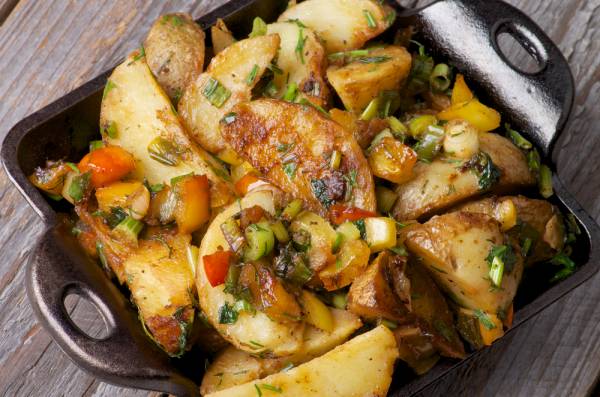We constantly hear, and may even say ourselves, “I can eat whatever I want since I worked out today,” or, “He or she is so active they can get away with eating that.” This attitude comes from people believing that weight loss and weight gain are as simple as counting calories.
We fail to understand that weight loss is much more complicated than calorie counting. The foods we eat can actually affect our performance and here’s how.
RELATED: Don’t Count Calories to Lose Weight: The Body Fat Set Point Theory
Rest Is Not the Same as Recovery
A major piece of increasing performance that we forget about is the recovery and regeneration process. It is not all about how hard we work in the gym. Our success also banks on a combination of smart training and appropriate recovery practices. From my experiences as a strength coach, I see that most people rest, but they do not recover.
“Highly active people need to eat more nutrient-dense foods to help maximize their recovery process.”
To maximize recovery we need adequate sleep, adequate vitamin D, effective stress management techniques, and appropriate nutrition. Participating in sport or highly intense workouts does not give someone the freedom to eat whatever he or she wants. Highly active people need to eat more nutrient-dense foods to help maximize their recovery process.
Gut Health Affects Our Performance
Our intestines are a major piece of our immune system. They help control what enters our bloodstream. At times, the tight gap junctions in the intestines can loosen up and unwanted particles can enter the bloodstream. This is known as intestinal permeability.
This whole process is controlled by a hormone called zonulin. When zonulin levels increase, then the tight gap junctions of our intestines loosen up and particles enter the bloodstream. This causes our immune system to react and launch an immune response. This immune response can lead to alterations in mood, difficulty losing weight, gastrointestinal disorders, and over 200 different autoimmune diseases. Focusing on our gut health is important for overall health, as well as for performance.
RELATED: Gluten Gone Wild: What Is It & What Is It Doing to Our Guts?

Strenuous activity can actually increase intestinal permeability.1 In fact, all types of stress can increase intestinal permeability. This includes psychological, pathological, physiological, and pharmacological stresses. This means our mood, disease state, medications, and our body’s own physiology, which is altered under strenuous exercise states.2 All of these factors play a critical role in recovery. And the better we recover from workouts, the harder we can hit it the next time in the gym.
RELATED: Stress Shown to Impair Recovery From Workouts
A Chronic State of Inflammation
Certain foods can also interfere with our performance and recovery. Cereal grains, such as wheat, have been shown to increase intestinal permeability.3 Dr. Alessio Fassano out of the University of Maryland has done some fantastic research on how foods interact with our intestinal barrier and their effects on the hormone zonulin. To put two and two together, if we are working out at high intensities and we are eating like crap, then we are going to be in a chronic state of inflammation.
How can we expect to recover and continue to perform at high levels in this type of scenario? If we are chronically inflamed, then our testosterone levels won’t peak and it will take longer to recover from workouts. This means that the next time we try to crush it in the gym, we may be able to only give 90% of our max effort, even when it feels like we are giving 100%. In the long run, this is a big deal to overall performance.
“To put two and two together, if we are working out at high intensities and we are eating like crap, then we are going to be in a chronic state of inflammation.”
Taking a probiotic may be one way to help us toward our performance goals. Not many research studies have been done on this topic, but the few that have showed probiotics may increase athletic performance through increased recovery and improved immune response.3 These positive studies show that our gut health is important not only for our overall health, but also for our training. (For more on this, Dr. Berardi did a good write-up regarding probiotic supplementation and performance.)

Summary
To best increase our gut health, we need to supply our beneficial gut bacteria with the right foods. A diet high in nutrient-rich veggies, fruits, meats, fish, eggs, and healthy fats can allow our beneficial gut flora to flourish.
RELATED: Gut Bacteria and Obesity – A Hidden Connection?
You may be asking how you can fuel those strenuous workouts by eating the foods listed above. Don’t forget our good starches, such as yams, sweet potatoes, and white potatoes. These foods not only contain the carbohydrates necessary for energy, but also fuel for our beneficial gut flora.
If you are working out strenuously, try changing up your diet to include more nutrient-dense foods. You should notice an increase in energy and recovery to go along with all of the positive health benefits of a nutrient-rich diet.
References:
1. Davis, M, et.al., “Sustained Strenuous Exercise Increases Intestinal Permeability in Racing Alaskan Sled Dogs.” Journal of Veterinary Internal Medicine 2008. Retrieved on November 9, 2014.
2. Lambert, G.P. “Stress-induced gastrointestinal barrier dysfunction and its inflammatory effects.” Journal of Animal Science 2008. Retrieved on November 11, 2014.
3. de Punder, K., et al. “The Dietary Intake of Wheat and Other Cereal Grains and Their Role in Inflammation.” Nutrients 2013. Retrieved on November 9, 2014.
4. Nichols, A. “Probiotics and athletic performance: A systematic review.” Current Sports Medicine Reports 2007. Retrieved on November 9, 2014.
Photos courtesy of Shutterstock.






